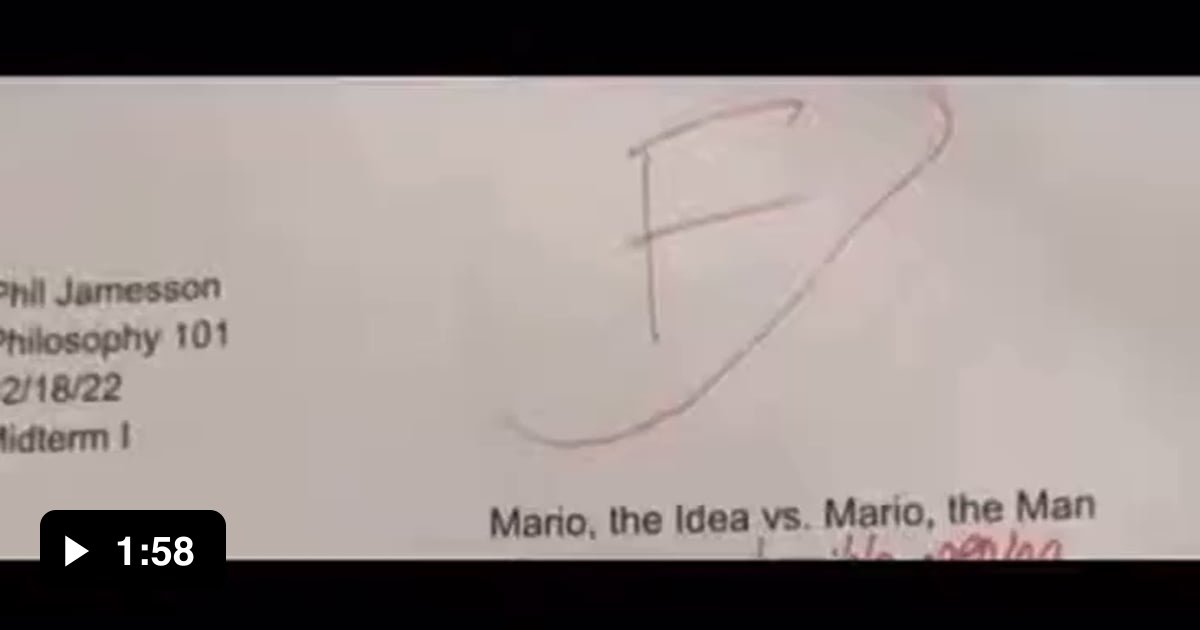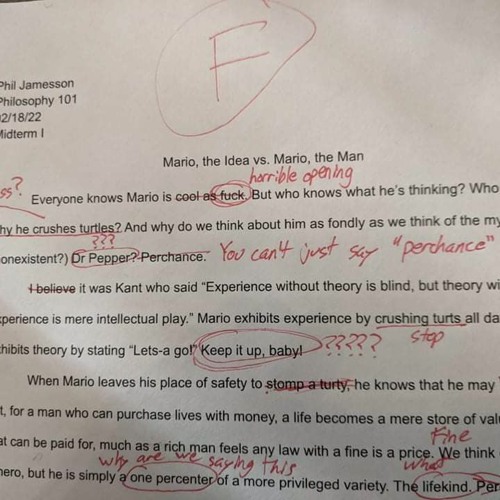Imagine a world where a portly plumber in overalls, wielding a magical mushroom and wielding a fire-breathing flower, was not just a video game character, but a cultural phenomenon, a symbol of childhood joy and a testament to the power of pixelated storytelling. That’s the reality of Mario, the beloved Nintendo icon who has transcended his digital origins to become a cultural touchstone. But what makes Mario so special? How did this simple character become a global phenomenon?

Image: 9gag.com
This article delves into the complex dichotomy of Mario the man versus Mario the idea, examining how his evolution has shaped the gaming landscape and captivated generations. We’ll explore the history of his creation, analyze his artistic and commercial impact, and consider the philosophical underpinnings that make him so resonant.
The Humble Beginnings: Mario the Man
Before he was a global icon, Mario was simply a character in a video game called “Donkey Kong”. Created by Shigeru Miyamoto, the mastermind behind Mario’s universe, this initial version of Mario was a carpenter named Jumpman, a far cry from the red-suited hero he later became. The game itself was a simple affair, with Jumpman dodging barrels and rescuing a damsel in distress, a concept that would become a recurring theme in Mario’s future adventures.
However, the magic of Mario didn’t lie just in the simple gameplay, but in his character design. Miyamoto, drawing inspiration from the iconic Popeye, designed a character with a recognizable silhouette, a charmingly goofy demeanor, and a sense of undeniable heroism. This combination resonated with players, laying the groundwork for a multi-generational love affair.
The Evolution of an Icon: Mario the Idea
With the release of “Super Mario Bros.” in 1985, Mario truly became an icon. The groundbreaking game introduced the now-legendary Mushroom Kingdom, with its vibrant colors, whimsical landscapes, and challenging platforming levels. More importantly, it introduced a new gameplay mechanic that transcended mere platforming. Mario’s ability to collect power-ups, transforming him into a fireball-spitting beast or a super-sized behemoth, added a strategic layer that made the game both deeply challenging and wildly engaging.
This evolution was not just about the game’s design, but about Mario himself. He shifted from a simple hero to a dynamic character with a complex history and an evolving personality. He gained a brother, a princess who was constantly rescued, and a cast of supporting characters, transforming from a mere pixelated figure into a fully realized character with depth and charm.
The Power of the Mushroom Kingdom: Mario’s Impact
It’s impossible to overstate Mario’s impact on the gaming industry. He’s credited with popularizing the platforming genre, establishing the foundation for countless games and franchises, and shaping the landscape of modern video games. Mario’s formula, seamlessly merging challenging gameplay, vibrant visuals, and engaging narrative, became a paradigm for countless developers.
But Mario’s influence goes far beyond the gaming world. He’s become a cultural touchstone, appearing in countless cartoons, movies, and other media. His image has adorned everything from t-shirts to breakfast cereal, and his iconic catchphrase, “It’s-a me, Mario!” has been embraced by audiences of all ages.

Image: soundcloud.com
Mario Beyond the Pixels: The Philosophical Underpinnings
Mario’s remarkable success stems not just from his colorful appearance or his engaging gameplay, but from his underlying message. Mario represents hope, perseverance, and the ability to overcome any obstacle. He never gives up, always pushing forward, even when faced with seemingly insurmountable challenges. He embodies the power of optimism and the pursuit of dreams.
This inherent message resonates with players of all ages and backgrounds, making Mario a universal symbol of courage and resilience. In a world increasingly dominated by cynicism and negativity, Mario offers a welcome dose of optimism, reminding us that even the most challenging situations can be overcome with a little bit of bravery and a whole lot of heart.
Mario The Man Vs Mario The Idea Full Essay
Mario’s Legacy: The Man, the Myth, the Legend
Mario’s journey, from humble beginnings to global icon, is a testament to the power of imagination and the enduring nature of simple storytelling. He’s a reminder that even the most seemingly mundane character can become a cultural icon, inspiring generations with the power of hope and the pursuit of dreams.
He’s not just a video game character; he’s a symbol, a cultural touchstone, and a testament to the human desire to escape into fantastical worlds and find meaning in the face of the mundane. Mario embodies the spirit of childhood joy, the power of imagination, and the unyielding hope that even in the darkest of times, a hero will always emerge to save the day.
For those who have ever picked up a controller and stepped into the Mushroom Kingdom, Mario is more than just a game, he’s a timeless friend, a symbol of joy, and a constant reminder that even the most challenging adventures can be overcome with a little bit of heart and a whole lot of determination.
So next time you see that familiar red cap and blue overalls, remember that Mario is more than a character; he’s a timeless metaphor for the power of belief, the allure of the journey, and the triumphant spirit that inspires us all to reach for our dreams.






